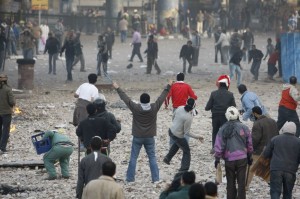 As EU leaders meet today, February 4, in Brussels, protests in Egypt will be culminating in what Egyptians are calling “The Day of Departure.” If events in Tunisia are any indication, Europe has thus far viewed the situation in the Eastern Mediterranean as a choice between democracy and stability. As fellow FPA blogger Benjamin Preisler pointed out, Europe, in the case of Tunisia, blatantly opted for the latter. In Egypt, Mubarak, not so long ago hailed by the German foreign minister as an “anchor of stability”, has been viewed as a necessary bulwark against Islamic extremism, and of course, a vital player in the Israeli-Arabic conflict.
As EU leaders meet today, February 4, in Brussels, protests in Egypt will be culminating in what Egyptians are calling “The Day of Departure.” If events in Tunisia are any indication, Europe has thus far viewed the situation in the Eastern Mediterranean as a choice between democracy and stability. As fellow FPA blogger Benjamin Preisler pointed out, Europe, in the case of Tunisia, blatantly opted for the latter. In Egypt, Mubarak, not so long ago hailed by the German foreign minister as an “anchor of stability”, has been viewed as a necessary bulwark against Islamic extremism, and of course, a vital player in the Israeli-Arabic conflict.
The stability vs. democracy line of thinking has resulted in a tepid reaction from Brussels and other European capitals, when talk fell on Mubarak. “We are following the situation in Egypt closely” would be a generic European diplomat’s response. One would certainly hope Europe’s diplomats found time to follow these events closely…
To be fair, as the protests in Egypt have progressed, Europe’s leaders have shown some, cautious, signs of strengthening their criticism of Mubarak. On Thursday, Nicolas Sarkozy, Angela Merkel, Silvio Berlusconi, Spanish premier Jose Zapatero and David Cameron issued a statement announcing that; “The process of transition must begin now,” It perhaps does not sounds like much, but when compared with Europe’s position on Tunisia, it is progress.
However, if Europe intends to prove itself a friend of the Egyptian and Tunisian people, place themselves firmly on the side of political reform, and thus secure Europe’s long-term position as a legitimate partner, it must unequivocally cease its tacit support of authoritarian strongmen and come out strongly on the side of democratic reform. Vague statements referring to a “transition” (transition to what?) will not suffice.
These are not merely tree-hugging, bleeding-heart notions. Support for democracy in Egypt is also founded in political reality. Consider the wave of chaotic dissent sweeping the eastern Mediterranean. It would undeniably seem that the assumption that Europe (and the West) must choose between a stable or democratic region is flawed. Supporting unpopular leaders could in fact end up strengthening popular dissent, creating a political vacuum that the extremist groups Mubarak was intended to be a bulwark against would all too gladly fill.
The Middle East is full of people who consider Western calls for democracy and human rights nothing more than a sham. In no region are the double standards of democratic nations so obvious. Egypt could prove an opportunity for Europe to demonstrate that it is prepared to support the humanitarian values it so strongly espouses.
And if the West were to stand by its commitment to elections that, say, the Muslim Brotherhood won? Perhaps this scenario is not has terrifying as some would make it out to be. For example, prominent Muslim Brotherhood figure Sobhi Saleh told the Wall Street Journal that the Brotherhood was closer to the Turkish, than Iranian example. And after all, distasteful as some of the Brotherhood’s views may be to a Westerner, how can a representative polity be formed in Egypt without something as unremarkable in those parts of the world as a religiously inspired political party? In this blogger’s view, it’s worth the risk. Democracy could indeed prove the most effective containment of Islamic extremism.